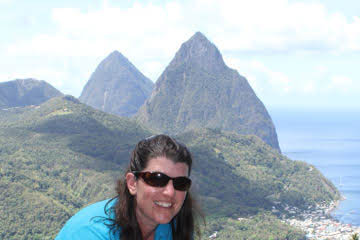As climate change advances and triggers more frequent and severe tropical storms, floods, droughts and rising sea levels, we may wonder what could be worse. The answer is all of the above if they strike those living in poverty.

Heather Stager’s master’s thesis in Environmental Studies at the University of Waterloo was based on the December 1999 Vargas tragedy in Venezuela. Landslides and floods claimed 10,000 to 50,000 lives. Stager, of Ottawa, is now working on a project probing the relationship of poverty to climate change and disasters in the Caribbean. One factor is that the homes of the poor are less able to withstand the impact of natural hazards, such as strong winds and flooding. In addition, because their homes are not high-value assets, the poor usually do not get media exposure that would reveal their plight.
“Our hope is that in this new work we will highlight these impacts, by exploring the complex elements, such as education levels and also the frequency of the impacts on poor households,” says Stager. “They are unable to get out of it, possibly because every time it rains their roofs leak and demand great investments in simple repairs.”
Stager says her group is creating a tool kit to gather the appropriate data on the vulnerability of the poor to climate change and disasters. These tools will be tested in Dominica, St. Vincent, Belize, Grenada and the British Virgin Islands. The kit has five different tools to make sure they touch the right aspects.
The risk varies with location, says Stager. “The Caribbean is most exposed to hurricanes. Between high winds and heavy rainfall, the poor are most severely affected.” Erosion and damage to coastal infrastructure such as ports and beaches are also a problem following storms and competing for limited relief funds.
“Water supplies are sometimes affected. A lot of households rely on rainwater for drinking purposes. If their rainwater at the house is insufficient, countries will bring in tanks of water from neighbouring islands.” Some countries are investing in desalination to offset the cost of bringing in water and to promote greater development of the local economies.
Sea levels are rising. Coastal erosion and the loss of beaches and coastal infrastructure are slowly taking place. Stager says many countries have experienced flooding but also droughts. Neither excess is good for its agriculture or food security.
In many cases, humans play a role that leads to detrimental effects. Building ports in the Caribbean can be counter-productive. Mangroves, which are tropical trees with twisted roots, thrive on low-lying islands. But in removing them to attract tourists via a new port, they have damaged the stability of the island. The degradation of coral in the ocean is another serious problem. In the Caribbean, coral is being restored by transplanting it onto reefs of importance to local communities or in protected areas. But after 12 years, only nine per cent of coral colonies survive.

Over-fishing in the Caribbean has taken a toll on fish population. For years, young fish have been caught before they have grown into adults. This, in turn, prompts fishermen to catch more of them to compensate for their smaller size. Heather says there is more commercial fishing now. “Local fisher folk must go farther out to sea to get larger fish, particularly in no-take zones near the coastal areas. There is not a lot of adult fish left in the coastal areas and the smaller fish don’t have as many eggs, so populations are not able to rebound quickly” she says. Thanks to climate change adaptation projects, the fisheries are recovering.
After working on her own for almost 10 years, Heather has started to get regular offers in her field. She was hired with a team to do an evaluation of a climate change adaptation project. Another company had funding for projects in the region, one of which was to improve fish habitat and fisher livelihoods.
Across the Caribbean, Jamaica, Grenada, St Lucia, Dominica, Saint Vincent and the Grenadines have implemented a program called C-FISH. It was developed by the CARIBSAVE Partnership, which is an environmental not-for-profit organization. The project’s goal is to strengthen community-based fish sanctuaries and marine protected areas.
Environmental, social and economic benefits can be attained from sustainable fisheries, such as tourism and natural coastal defences. There are two international responses to climate change. One is called “adaptation” and it works well on small island states. It promotes adapting to the perils of climate change already occurring. Building stronger houses and placing them on secure locations is an example.
The other international focus is “mitigation,” which takes a longer-term approach. Striving to lower heat-trapping greenhouse gases is a major focus of mitigation.




